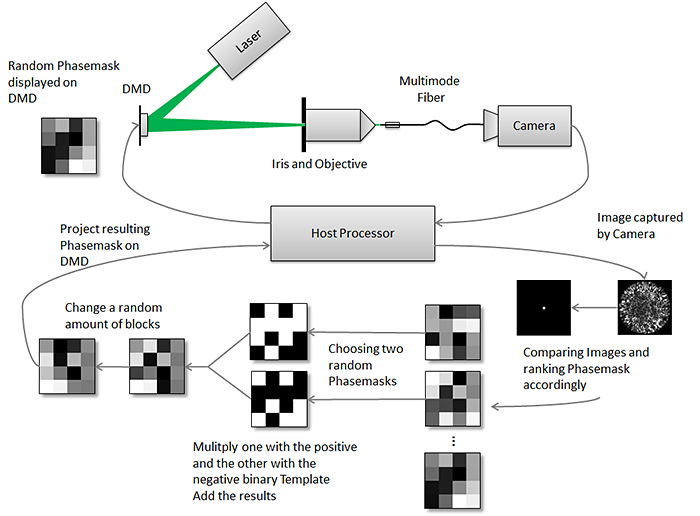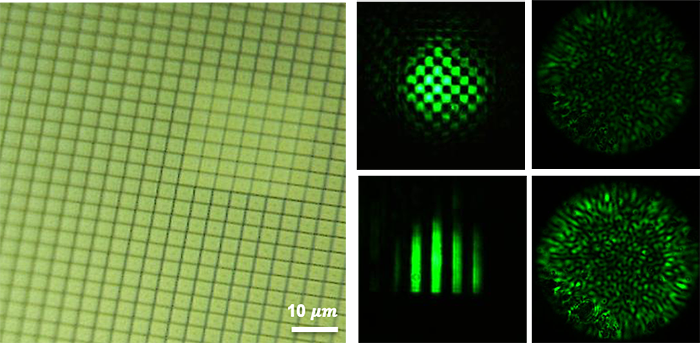Generation of focused light patterns at fiber tips using Digital Micromirror Device (DMD)
- Type:Bachelor or Master Thesis or Internship
- Supervisor:
- Field of Study:
Mechanical/electrical/computer/informatics engineering
Job description
A DMD, “digital micromirror device”, is a micro-opto-electro-mechanical system consisting of upto 8 million micromirrors used in projector systems. Each mirror can be tilted individually to modulate the light to generate complex illumination patterns. The goal of this project is to use a DMD as an optical excitation for studying photo-sensitive bacteria. The light pattern from the DMD is coupled to a multi-mode fiber (MMF) of 50-micron core diameter. By varying the patterns projected on the DMD, the light at the distal end of the fiber can be focused to a 3 µm spot. Genetic optimization algorithm can be used to identify the phase pattern that generates the focused spot. The hardware control of the processor and the camera and the algorithms will be implemented using C++ programming.
The specific tasks within the project will be: (i) Embedded system programing; (ii) Genetic algorithm implementation using C++; (iii) Testing and optimization of the code in the optical setup to obtain the focused; (iv) Design and fabrication of 3D parts.
You will be integrated in a larger team within the SPA-Lab. This is a complete project, offering the possibility to handle embedded system and optics and test the measurement setup, giving you the opportunity to co-author conference and/or journal publications.

Figure 1: Typical optical setup used for the generation of focused spot of light in a MMF. The host processor is used to generate phase masks that are projected on to a DMD and coupled to a MMF. The processor also captures the pattern on the distal end of the fiber and the optimization cycle continues until a desired pattern is obtained.

Figure 2: LEFT: Micrograph of the DMD where each square is an individual mirror. RIGHT: Images of different patterns projected by the DMD and the corresponding speckle patterns obtained at the far end of the fiber.
Starting date: by appointment
Contract duration: 6-9 months
Qualification:
- good academic record (marks); curious about various aspects of science;
- enthusiastic to work in a multidisciplinary environment;
- independent thinker and team player;
- in particular: strong interest in Embedded systems, C++ programming and opto-electronics
Technical contact
M.Sc. Albina Nirupa Julius
Karlsruhe Institute of Technology
Institute of Microstructure Technology
P.O. Box 3640
76021 Karlsruhe
phone: +49 721 608-29316
e-mail: albina julius ∂does-not-exist.kit edu
Dr. Vlad Badilita
Karlsruhe Institute of Technology
Institute of Microstructure Technology
P.O. Box 3640
76021 Karlsruhe
phone: +49 721 608-29315
e-mail: vlad badilita ∂does-not-exist.kit edu

